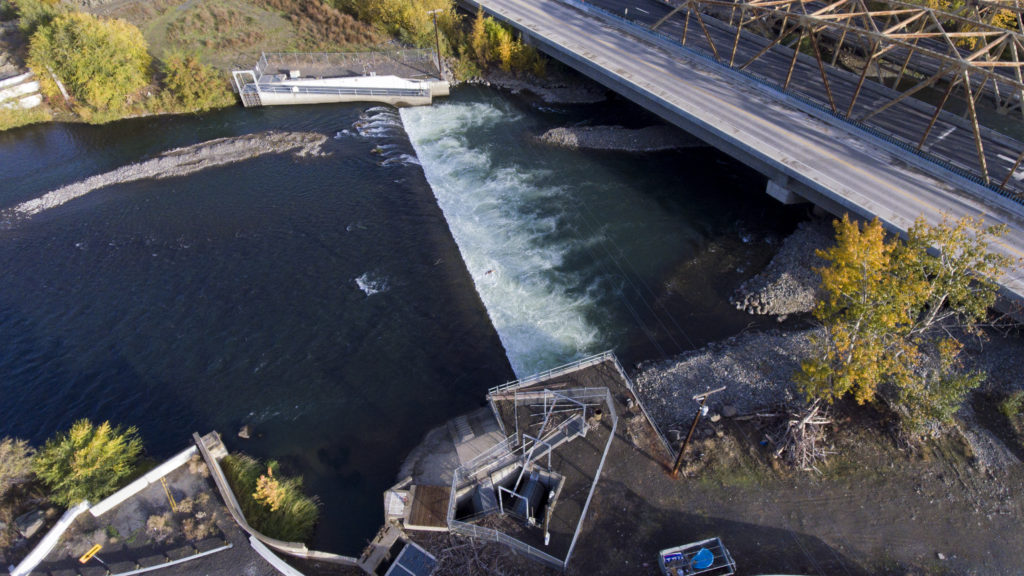
Yakima, Wash. – November 29, 2016 – Today, Yakima County announced it is the recipient of a $75,000 grant from the Open Rivers Fund, a program of Resources Legacy Fund (RLF), supported by a 50th anniversary grant from the William and Flora Hewlett Foundation. The funds will assist with the removal of the Nelson Dam, an 8-foot high irrigation diversion dam owned by the City of Yakima on the Naches River.
The Naches is an important salmon bearing river that is the largest tributary of the Yakima River. Sediment has built up for several miles behind Nelson Dam, exacerbating flooding in the area upstream from businesses, homes and roads. Removing Nelson Dam is an essential part of a plan to greatly reduce flood risks and improve public safety during floods.
“Removal of the Nelson Dam is part of a complex plan to improve fish passage, reduce operations expense for the several diversions, expand the flood plain to reduce the flood damage and risk to public safety and improve the salmon habitat,” said Joel Freudenthal, Senior Natural Resources Specialist for Yakima County. “The City and the County are incredibly grateful to collaborate with the Open Rivers Fund to move this plan forward and see it through to fruition.”
Once removed, the dam will be replaced with a roughened channel that allows the City to divert irrigation water at lower operations and maintenance costs. Fish will be able to freely pass upstream and downstream at all water levels, something the existing Nelson Dam does not accommodate. Reestablishing sediment transport will improve about 6 miles of floodplain and river habitat upstream and downstream of the dam in an area that is important for fishery spawning and rearing.
This effort is supported by a broad coalition including the City of Yakima, Yakima County, the Yakama Nation, American Rivers, the Washington Department of Fish and Wildlife, the Washington Department of Ecology, the Bureau of Reclamation, North Yakima Conservation District, National Marine Fisheries (NOAA) the Yakima Tributary and Habitat Project, the Yakima Basin Fish and Wildlife Recovery board, and various irrigation districts. Floodplains by Design, a collaboration between the Department of Ecology, The Nature Conservancy and the Puget Sound Partnership to provide funding for integrated floodplain management projects, has awarded grants for restoration work, property acquisition and levee setbacks surrounding the dam.
The removal of the Nelson Dam is part of the Yakima Basin Integrated Plan, which is supported by all relevant tribal, federal, state and local government agencies, NGOs and other organizations. Resources Legacy Fund’s Open Rivers Fund will provide $75,000 to support project design and permitting that meets fishery and conservation goals. The effort will receive an additional $25,000 for outreach and communications in order to engage stakeholders, build public awareness and promote this approach to river restoration.
The Open Rivers Fund is the largest philanthropic fund dedicated to dam removal and river restoration. It will provide resources to communities that are working to get dam removal and infrastructure modernization projects off the ground and will reduce cost barriers for these projects.
“Removal of the Nelson Dam and replacing it with a roughened channel will address an important safety concern for our community,” said David Brown, City of Yakima Water/Irrigation Manager. “When we have opportunities like this one to improve the safety of our community and benefit the environment while saving taxpayer dollars, it just makes sense to pursue.”
“Working with irrigators, the Yakama Nation, environmentalists, counties, and state and federal agencies, we have designed a project that will reflect today’s needs with today’s infrastructure,” said Mike Leita, Yakima County Commissioner. “Our strategy has been to work hand in hand not fist to fist – and it has been effective.”
“Removing the barrier to fish passage at Nelson Dam is an important part of the Yakama Nation’s work to restore abundant salmon and steelhead to the Naches and Yakima Rivers,” said Phil Rigdon, Department of Natural Resources Deputy Director for the Yakama Nation. “The project will also greatly improve habitat up and downstream of the dam.”
Media resources, including photos and videos, are available here.
Read a fact sheet on the Nelson Dam removal project.
Read the Open Rivers Fund announcement press release.
Read statements of support from national leaders and community members.
CONTACT:
Liz Judge, William and Flora Hewlett Foundation, 970.710.9002, ljudge@hewlett.org
Mark Kleinman, Resources Legacy Fund, 916. 442.5057, mkleinman@resourceslegacyfund.org
Caitlin Scott, Full Court Press Communications, 510.550.8176, caitlin@fcpcommunications.com
Sarah Hersh-Walker, Full Court Press Communications, 510.550.8170, sarah@fcpcommunications.com
###
About The William and Flora Hewlett Foundation
The William and Flora Hewlett Foundation is a nonpartisan, private charitable foundation that advances ideas and supports institutions to promote a better world. For 50 years, we have supported efforts to advance education for all, preserve the environment, improve lives and livelihoods in developing countries, promote the health and economic well-being of women, support vibrant performing arts, strengthen Bay Area communities and make the philanthropy sector more effective. On the web: www.hewlett.org
About Resources Legacy Fund
Since its founding in 2000, Resources Legacy Fund (RLF) has embodied an innovation in conservation philanthropy as a donor-driven enterprise focused on lasting results. RLF offers its donor-partners a unique mix of capabilities to deliver outcomes that improve environmental sustainability in Western North America as well as in oceans and fisheries worldwide. RLF provides leading-edge strategy and execution that draws on world-class, mission-driven environmental, conservation, and policy expertise to achieve large-scale conservation outcomes, engaging emerging urban communities as well as established conservation constituencies, business leaders, and policy officials. www.resourceslegacyfund.org
